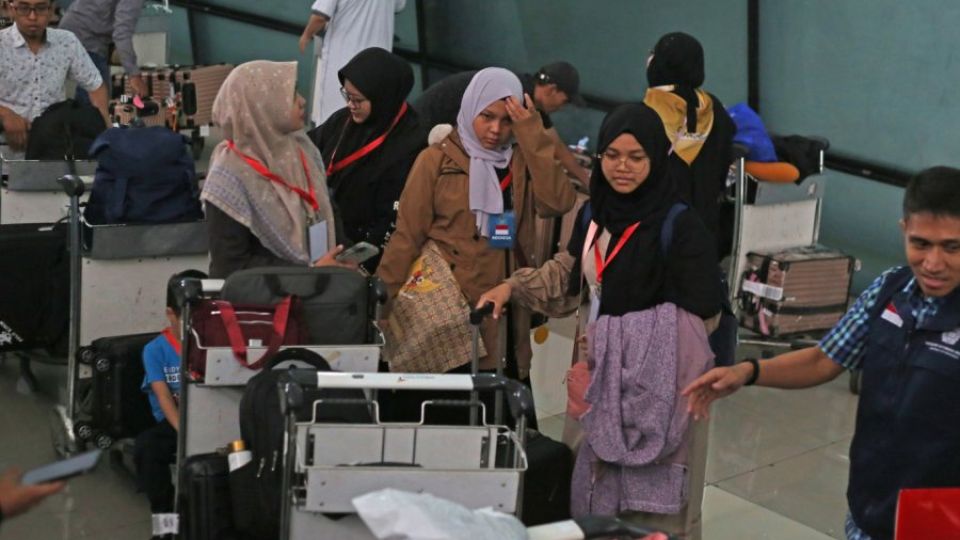(ANN/JAKARTA POST/PHILIPPINES DAILY INQUIRER) – The Indonesian government has evacuated another 14 citizens from Lebanon, bringing the number of Indonesians repatriated from the war-torn country to 79.
The 10 male and four female citizens from various regions in Indonesia, including Aceh, West Sumatra, Jakarta and Bali, left Beirut on Wednesday.
“We evacuated them via air transport from Beirut to Jakarta, with transits in Jeddah [Saudi Arabia] and Dubai [the United Arab Emirates]. They arrived at Soekarno-Hatta International Airport on Thursday,” Indonesian Foreign Minister Retno LP Marsudi said in a statement on Friday.
The repatriates were later transported to their hometowns with the support of various state institutions, the statement said.
After the escalation in the Israeli military’s attacks on Lebanon’s Iran-backed militant group Hezbollah, the Indonesian Embassy in Beirut has evacuated 79 citizens and the foreign spouse of an Indonesian since Aug. 10, divided into six groups.

Separately, 17 Indonesians working in the country or married to a Lebanese citizen have returned on their own, either self-funded or through the support of their companies.
As of Thursday, 85 Indonesians remain in Lebanon, most of whom have local spouses and refuse to leave the Middle Eastern country.
The Indonesia government has been urging its citizens to evacuate Lebanon as soon as possible for their personal safety, advising them not to wait until “the situation gets worse”.
Earlier this month, President Joko “Jokowi” Widodo instructed the Foreign Ministry to prioritise citizens’ safety and evacuate them posthaste from Lebanon.
Meanwhile, a total of 192 Filipinos are expected to be repatriated from Lebanon from October 11 to 28, Philippines’ Migrant Workers Secretary Hans Leo Cacdac said on Thursday.
In a press briefing, the Department of Migrant Workers (DMW) official also said that 11 Filipinos from the Middle Eastern country will arrive in Manila in the coming weekend.
Cacdac added that documents of around 413 Filipinos who already sought repatriation are currently being processed by the Philippine and Lebanese governments.
“We have 179 Filipinos in our shelters; we have four shelters all around Beirut. We will not disclose, of course, the location, but we have 179 sheltered in our four facilities at the moment. The capacity is not yet filled, so definitely our four shelters can still accommodate some more stayers or occupants,” he also said.
Cacdac also assured the overseas Filipino workers (OFWs) who would be repatriated that government assistance awaits them once they arrive in the country.
“We’d like to believe we are already addressing or have addressed the matter of the loss of income that may incur if they come home. So, the financial assistance that we’re offering can go up as high as PHP150,000 between DMW and OWWA [Overseas Workers Welfare Administration] upon arrival. That’s good for four to six months’ salary,” he said.
The Department of Social Welfare and Development is also set to dispense financial aid to the OFWs, while the Department of Health will provide medical assistance, including psychosocial support.
Furthermore, Cacdac said that the Department of Foreign Affairs (DFA) is reviewing whether there is a need to raise the alert level from 3 to 4.
If the DFA raises the alert level to 4, mandatory repatriation of OFWs in Lebanon will be enforced. This level is only declared in cases of severe external threats.
The Israeli military’s air and ground offensives targeting cities in Lebanon, including the capital Beirut, have intensified in the past month.
Lebanese authorities estimate that the violence has killed hundreds of people and displaced more than 1 million, the majority since Sept. 23.
An official from the United Nations migration agency called the displacement of people in Lebanon “devastating” and warned that international support was falling short of the needs of displaced people.
“Lebanon needs more support. What has been offered so far is minimal and does not match the needs,” said Othman Belbeisi, Middle East and North Africa director at the International Organization for Migration, as quoted by AFP.




